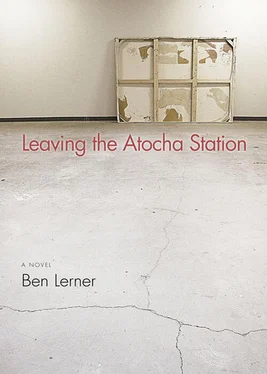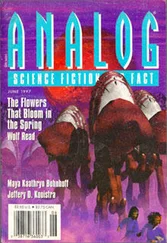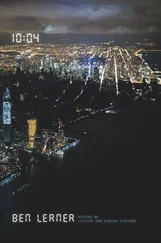Beautiful people were there again, a few of whom I recognized from the gallery or Teresa’s apartment. Everything was a little changed, a little charged. For whatever reason I thought again of the photographs of Teresa’s distant family. I didn’t know how to compose my face, if indifference tinged with vague disdain was still the right expression. If I could have smiled Teresa’s inscrutable smile, I would have. One of the paintings was covered with black felt. It didn’t look like a covered painting from the nineteenth century; it looked like contemporary art. People were talking about politics, or everything seemed suddenly political. I overheard conversations about the role of photography now, where “now” meant post — March 11. A “post” was being formed, and the air was alive less with the excitement of a period than with the excitement of periodization. I heard something about how the cell phone, instrumental to organizing the marches, was the dominant political technology of the age. What about Titadine, the form of compressed dynamite used in the attacks, I wanted to say; wasn’t that the dominant technology? I said this to Teresa, who corrected me gently as we poured ourselves drinks: these attacks were “made for TV”; she said the phrase in English.
I meant to pour myself gin, but when I tried it, I discovered it was silver tequila. At seventeen I had made myself violently ill drinking tequila and had never had it again, except to taste it every couple of years to see if it still disgusted me, which it always did. I thought back to that night in Topeka, vomiting for an hour near a bonfire and then sleeping in the bed of a pickup in the middle of the winter. I could smell the campfire and felt cold and a little dizzy. Then I thought of Cyrus trying to wash the taste out of his mouth. Teresa took the drink from me and handed me a fresh one, a vodka tonic, which smelled clean. You don’t want tequila, she said, as though she knew what I was remembering, as though we had known each other for many years. I was becoming almost frightened of her grace and gifts of anticipation; I worried that I would not be able to lie to her, and I worried, not for the first time, that whenever I’d thought I’d successfully lied to her, she had in fact easily seen through me. If I were forced to rely on only the literal truth, she would soon grow tired of me. I thought I would attempt to preempt or slow this situation by naming it, and as we walked out back with our drinks, I said to her in English, “You are the most graceful and protean person I know. The way you handed me the coffee right when I awoke or the way just now you took the tequila from me or,” I paused to think of an example not involving drinks, “the way you can move without apparent transition from your stylish apartment to a protest.”

“The proper names of leaders are distractions from concrete economic modes.”
“Why do you keep speaking to me in English?” she asked, with something like concern.
I ignored the question and went on, “But I’m worried you’re too cool for me, that you’ll realize I’m in fact a fraud. An inelegant fraud. I won’t be able to fool you and you’ll get bored.” As I said this, I thought it would be impossible to hide my pills from her. I had a sudden, involuntary memory of the Ritz.
“All you’re describing,” she said in Spanish, “is the personality of a translator. From apartment to protest, from English to Spanish.” If she had spoken in English, I would have found it a little grand; in Spanish I experienced it as profound. I wondered if she’d weighed the sentence in both languages before selecting the one that would produce the desired effect.
Teresa started to remove her clothes and for a second I thought she had lost her mind. But she had a swimsuit on underneath, and she left her clothes in a little pile and slipped noiselessly into the heated, lighted pool, as if to punctuate the ease with which she could move between media. There were a few other people in the pool, all of them women, all of whom appeared to know Teresa. I found a nearby patio chair and lit a cigarette, reiterating to myself my promise that I would never smoke another cigarette once I left Madrid, but that until then I gave myself permission to smoke without guilt. This little psychological mechanism, as crucial to my smoking as lighter or match, reminded me of Arturo’s comment about staying in Spain. I saw Teresa dive underwater and thought, why wouldn’t I stay? I could make enough money teaching English to keep the same apartment. Maybe Arturo would pay me to work at the gallery in some capacity. Maybe my parents would send me money. Or maybe Teresa would support me. I would write and she would translate and we would walk through El Retiro at dusk. I imagined people visiting from the U.S., imagined their amazement and envy at the life I had made for myself. How long would I stay beyond the fellowship, I wondered. Maybe another year; I would make myself really learn Spanish, which seemed dimly possible now, and I would also begin to translate Teresa’s poems into English. I would publish a book of poems and then a book of translations and I would come home, perhaps with Teresa, as a celebrated author imbued with Iberian mystery. Or would I never go home, except to visit? I finished my drink and went to the bar for another and there was the man who had argued with Abel after my reading, the man who believed the disjunction of my poetry was a radical political gesture.
He recognized me, but he misremembered our conversation. “Do you still believe that poetry can change the world?” he asked me.
I paused. “It can exacerbate the world’s contradictions,” I said, mumbling the verb I didn’t really know.
“Well, it’s not poetry that makes things happen,” he said.
“Poetry makes nothing happen,” I said in English. He blinked at me. “What made all of this,” I said in Spanish, waving my hand to include the party in the events of the last few days, “happen?”
“Bodies in the streets,” he said. At first I thought he meant dead bodies; then I realized he meant the bodies of protestors. I tried to describe that confusion, the two ways one could understand his answer, but I garbled the Spanish and abandoned the thought.
I went back outside and sat in the same chair and drank my drink. Teresa was no longer in the pool and I looked around for her but couldn’t see her. When my drink was finished I fixed another, this time at the little outside bar, and then I walked beyond the pool toward the softly lit garden where I had once heard Rafa sing. When I encountered Teresa sitting on the stone bench kissing Carlos, my jealousy and rage felt like solid things, things formed over many years, so it seemed like they preceded their cause, were detached from the scene. It was a while before I noticed two of the other swimmers nearby, maybe five feet from the bench, faint glow of white towels, sharing a joint. I sat down beside them and one of them passed me the joint, saying something like, “Here is the poet.” Teresa had stopped kissing or letting herself be kissed by the man who I now saw was not Carlos, was another handsome man I didn’t know; she had noticed me, entirely without concern. I considered getting up and storming off to the edge of the property overlooking the hill where I had told Teresa my mother was dead. I imagined striking the man, who was walking back to the party now, repeatedly in the face. The joint was before me again and the woman who passed it began to speak to me and either because I was high or upset I couldn’t understand her Spanish, but that’s not really right. Her Spanish, like Teresa’s poem, became a repository for whatever meaning I assigned it, and I felt I understood, although I knew I was talking to myself. It was as if she said: Think about the necklace. Think about the making of the necklace. About Isabel’s brother’s notebook. I could hear what she was actually saying beneath this and I heard myself respond but all of that was very distant. It was as if she said: Imagine her brother writing. Think of the little scrap of paper Teresa tore from her novel and put into your notebook. Think of the hash transported inside one body as a solid and expelled and sold and then drawn into your body as vapor and gas. Think of the bombers purchasing the backpacks. Always think of the objects. Think of the necklaces and novels and bodies torn apart by the blast. Think of the making of the necklaces and the novels and the bodies and Isabel’s brother in the crushed red car. But then think of a poster of Michael Jordan on the wall of Isabel’s brother’s room while he wrote the years down in the notebook. Where is that poster now. And think of the field opposite the telephone pole her brother wrapped the car around. How you can turn your attention away from the crushed red car and his body and walk into the field where nothing is happening, just indifferent wind in the indifferent grass, but a particular wind in particular grass. You can stay there for as long as you want, easily blocking out the sirens. Or you can enter the poster with the sea of camera flashes as Michael Jordan jumps and you can leave the arena as the crowd is roaring and walk into the Chicago of the recent past where novels are being written and necklaces are being made and gases are being inhaled and dates are being memorized by brains and brains destroyed in crashes. You can see all of this from a great height and zoom out until it is no longer visible or you can zoom in on the writing hand or the face of the dead, zoom in until it’s no longer a face. Or you can click on something and drag it. You can adjust the color or you can make it black and white. You can view any object from any angle or multiple angles simultaneously or you can shut your eyes and listen to the crowd in the arena or the sirens slowly approaching the red car or the sound of the pen writing down the years as silver is hammered and shaped.
Читать дальше













